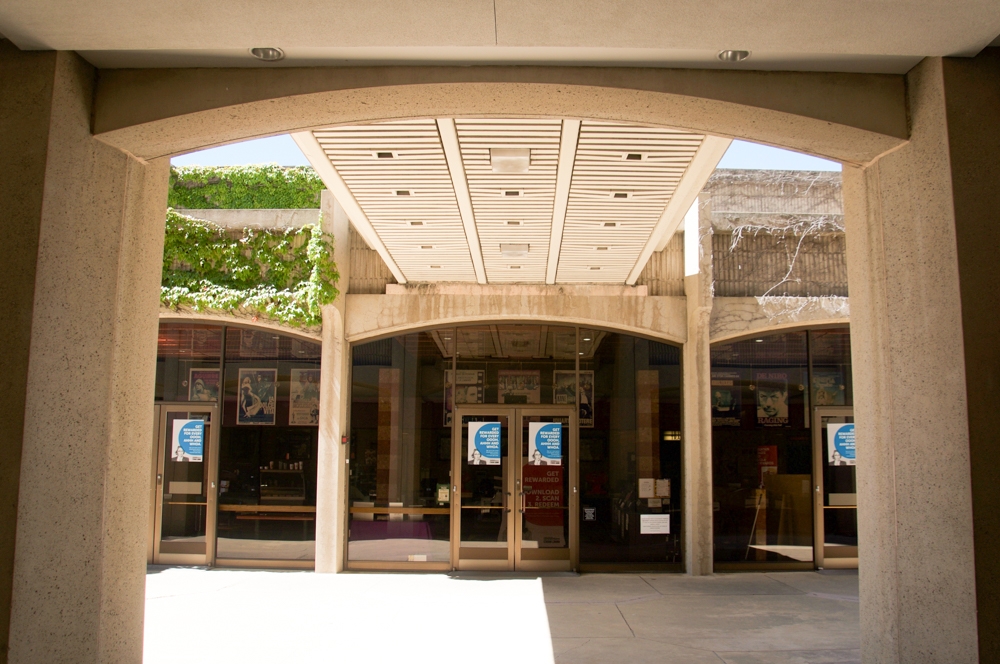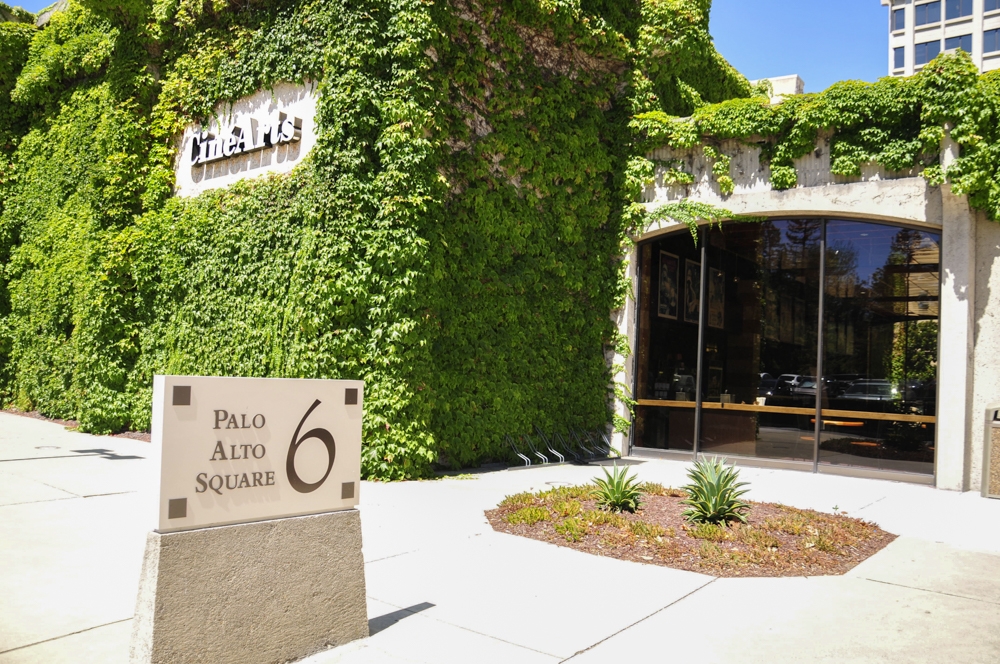CinéArts at Palo Alto Square, a movie theater that for decades has been a popular destination for local film lovers, will not be reopening after the COVID-19 pandemic, the theater's parent company confirmed to this publication.
Like other entertainment venues across California, the movie theater has been closed since March 2020, when the onset of the COVID-19 pandemic and the ensuing public health orders forced it to shut down. Unlike most others, the Palo Alto Square institution will not be taking part in California's reopening.
"In light of the impact of COVID-19, Cinemark can confirm that it has made the business decision to permanently close its CinéArts at Palo Alto Square theater," a spokesperson for Cinemark told this publication in a statement.
While the pandemic may have contributed to the permanent closure of CinéArts, its future has been in doubt for years. The Texas-based theater company Cinemark, which purchased the Palo Alto theater from Landmark in 2001, had considered closing it in the summer of 2016, a decision that prompted an outpouring of concern from area residents and Palo Alto's elected leaders.
At that time, Cinemark had attributed its decision to close the movie theater to the changing market for movies, the theater's condition and the large amount of money that the company would need to invest to update it. The closure was narrowly averted after Cinemark inked a deal with Hudson Pacific Properties, the owner of Palo Alto Square, that extended the theater's operations until September 2018. As part of the deal, Hudson Pacific was required to make some building and landscaping upgrades.
Even at that time, however, Palo Alto city leaders had acknowledged that the deal represented only a temporary reprieve. Today, the website lists CinéArts at Palo Alto Square as "permanently closed" and states: "We look forward to welcoming you to another Cinemark location near you. We apologize for any inconvenience."
Cinemark owns numerous other theaters in the area, including Century Cinema 16 in Mountain View and Redwood Downtown 20 and XD in Redwood City. The Palo Alto Square theater is much smaller and, in many ways, quainter than either of those venues. Unlike its neighbors, CinéArts at Palo Alto Square focused largely on foreign, independent and arthouse films.
But while its small size and focus on independent movies may have made it harder for the Palo Alto theater to be as lucrative as the larger theaters showing blockbusters, these traits also have endeared CinéArts to local cinephiles. In 2016, more than 2,600 residents signed a petition within days of learning of Cinemark’s plans to close, urging the city and Hudson Pacific to retain CinéArts as a tenant at Palo Alto Square. The theater, the petition stated, "provides a critical part of cultural and entertainment life in Palo Alto."
"As only one of two first-run theaters in town, this theater provides access to valuable opportunities not otherwise possible in our community, including several prestigious film festivals, such as the United Nations Affiliated Film Festival and San Francisco Jewish Film Festival, and the popular New York Metropolitan Opera (The MET) simulcasts," the petition stated.
This time, there was little warning to the public about the theater's closure. Cinemark did not make any public statements about the closure and the City Council never publicly mentioned the closure, in sharp contrast to 2016 and 1997, when council members fought to keep the theater open.
This time, the timing of the closure made public engagement nearly impossible. Cinemark's decision was made in May — at a time when all other venues were similarly closed and the city was in social-distancing mode. This is in sharp contrast to 2016, when the theater abruptly stopped showing listings for future screenings, prompting inquiries from residents and the media.
Mayor Tom DuBois said the council learned about the closure just last week, when it received a letter from Hudson Pacific informing city staff about Cinemark's decision to close the theater. The movie-theater chain formally notified Hudson Pacific in May about the theater's closure.
"Century does not make this decision lightly, but given the unprecedented and tragic circumstances, Century has made this difficult decision," wrote Paul Ledbetter, real estate counsel to Century Theatres, one of the brands owned by Cinemark. "As you are aware, Century and the theatre exhibition industry as a whole faced a particularly acute challenge stemming from the COVID-19 outbreak due to the various local, State and Federal mandates specifically requiring the closure of public motion pictures. While such mandates were wide and prudent given the situation, it unfortunately resulted in economic hardships and unintended consequences for Century that ultimately led to this decision."
While the decision appeared to have been finalized in May, Hudson Pacific didn't inform the city about the theatre's closure until June 22, the council's final day in session before its summer recess. By that time, Cinemark had already removed its equipment from the building and returned the keys to Hudson Pacific.
Shawn McGarry, Hudson Pacific's senior vice president for Northern California, noted in his email to the city that Hudson Pacific has been offering the theater rents that are "well below market" in order to help it remain open.
"We had ongoing discussions with CinéArts to work with them throughout the pandemic, however, they ultimately made the decision to permanently close this location," McGarry wrote.
It remains unclear whether or not another theater company will move into the space left behind by CinéArts. The city approved the six-building development known as Palo Alto Square in 1969 through the "planned community" zoning, which allows exemptions from development standards such as height and density limits in exchange for public benefits. The zoning ordinance has since been revised twice, most recently in 2000.
While the ordinance lists theaters as a permitted use at the campus — along with banks, insurance firms, professional offices, restaurants and a 300-room hotel — it does not explicitly mandate a theater. However, city leaders and planning staff have argued in recent years that because the map associated with the 1969 PC ordinance showed a theater, the council’s approval of the map effectively makes the theater a required use.
Palo Alto city staff did not immediately respond to questions about the site's zoning and whether or not a theater is required. DuBois said that he hopes the city and Hudson Pacific can work together to find another theater chain that can fill that space. He cited as an example Alamo Drafthouse, a small theater in San Francisco's Mission District that is famous for serving food and beer to its movie patrons.
"There's quite a number of chains that specialize in a smaller footprint," DuBois said. "They're not necessarily looking for 20 screens, but maybe food and drinks and movies."
DuBois said the city has received some correspondence over the past week from residents who had just learned about the theater's closure.
"It served a unique need for independent film," he said. "I think a lot of people really liked it," DuBois said.
Hudson Pacific Properties, which purchased Palo Alto Square at 3000 El Camino Real from EQ Office in 2014, has so far not made any decisions about what will happen to the theater, according to the company.
"We are just beginning internal discussions about the space and unfortunately do not have any further details to share at this time," Meryl Vissel, a Hudson Pacific spokesperson, said in a statement Monday.




Comments